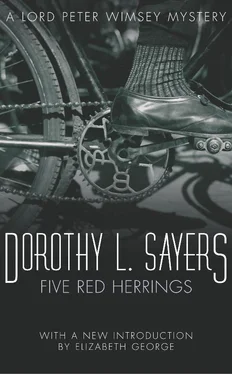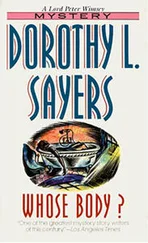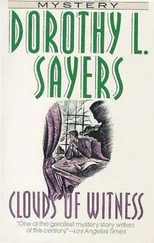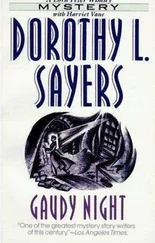The others nodded silently. The row between Campbell and the golf-club secretary at Gatehouse had indeed become local history.
‘And I would not blame Strachan, neither,’ went on McGeoch. ‘Here’s Campbell only lived two seasons in Gatehouse, and he’s setting the whole place by the ears. He’s a devil when he’s drunk and a lout when he’s sober. It’s a great shame. Our little artistic community has always gotten on well together, without giving offence to anybody. And now there are nothing but rows and bickerings — all through this fellow Campbell.’
‘Och,’ said Murdoch, ‘he’ll settle down in time. The man’s no a native o’ these parts and he doesna verra weel understand his place. Forbye, for all his havers, he’s no a Scotsman at a’, for everybody knows he’s fra’ Glasgow, and his mother was an Ulsterwoman, by the name of Flanagan.’
‘That’s the sort that talks loodest,’ put in Murray, the banker, who was a native of Kirkwall, and had a deep and not always silent contempt for anybody born south of Wick. ‘But it’s best to pay no attention to him. If he gets what is coming to him, I’m thinking it’ll no be from anybody here.’
He nodded meaningly.
‘Ye’ll be thinking of Hugh Farren?’ suggested McAdam.
‘I’ll be naming no names,’ said Murray, ‘but it’s well known that he has made trouble for himself with a certain lady.’
‘It’s no fault of the lady’s,’ said McGeoch, emphatically.
‘I’m not saying it is. But there’s some gets into trouble without others to help them to it.’
‘I shouldn’t have fancied Campbell in the rôle of a home-breaker,’ said Wimsey, pleasantly.
‘I shouldn’t fancy him at all,’ growled Waters, ‘but he fancies himself quite enough, and one of these days—’
‘There, there,’ said Murdoch, hastily. ‘It’s true he’s no a verra popular man, is Campbell, but it’s best to be patient and tak’ no notice of him.’
‘That’s all very well,’ said Waters.
‘And wasn’t there some sort of row about fishing?’ interrupted Wimsey. If the talk had to be about Campbell, it was best to steer it away from Waters at all costs.
‘Och, ay,’ said McAdam. ‘Him and Mr. Jock Graham is juist at daggers drawn aboot it. Mr. Graham will be fishing the pool below Campbell’s hoose. Not but there’s plenty pools in the Fleet wi’out disturbin’ Campbell, if the man wad juist be peaceable aboot it. But it’s no his pool when a’s said and dune — the river’s free — and it’s no to be expectit that Mr. Graham will pay ony heed to his claims, him that pays nae heed to onybody.’
‘Particularly,’ said McGeoch, ‘after Campbell had tried to duck him in the Fleet.’
‘Did he though, by Jove?’ said Wimsey, interested.
‘Ay, but he got weel duckit himsel’,’ said Murdoch, savouring the reminiscence. ‘And Graham’s been fushin’ there every nicht since then, wi’ yin or twa of the lads. He’ll be there the nicht, I wadna wonder.’
‘Then if Campbell’s spoiling for a row, he’ll know where to go for it,’ said Wimsey. ‘Come on, Waters, we’d better make tracks.’
Waters, still sulky, rose and followed him. Wimsey steered him home to his lodgings, prattling cheerfully, and tucked him into bed.
‘And I shouldn’t let Campbell get on your nerves,’ he said, interrupting a long grumble, ‘he’s not worth it. Go to sleep and forget it, or you’ll do no work tomorrow. That’s pretty decent, by the way,’ he added, pausing before a landscape which was propped on the chest of drawers. ‘You’re a good hand with the knife, aren’t you, old man?’
‘Who, me?’ said Waters. ‘You don’t know what you’re talking about. Campbell’s the only man who can handle a knife in this place — according to him. He’s even had the blasted cheek to say Gowan is an out-of-date blunderer.’
‘That’s high treason, isn’t it?’
‘I should think so. Gowan’s a real painter — my God, it makes me hot when I think of it. He actually said it at the Arts Club in Edinburgh, before a whole lot of people, friends of Gowan’s.’
‘And what did Gowan say?’
‘Oh, various things. They’re not on speaking terms now. Damn the fellow. He’s not fit to live. You heard what he said to me?’
‘Yes, but I don’t want to hear it again. Let the fellow dree his own weird. He’s not worth bothering with.’
‘No, that’s a fact. And his work’s not so wonderful as to excuse his beastly personality.’
‘Can’t he paint?’
‘Oh, he can paint — after a fashion. He’s what Gowan calls him — a commercial traveller. His stuff’s damned impressive at first sight, but it’s all tricks. Anybody could do it, given the formula. I could do a perfectly good Campbell in half an hour. Wait a moment, I’ll show you.’
He thrust a leg out from the bed. Wimsey pushed him firmly back again.
‘Show me some other time. When I’ve seen his stuff. I can’t tell if the imitation’s good till I’ve seen the original, can I?’
‘No. Well, you go and look at his things and then I’ll show you. Oh, Lord, my head’s fuzzy like nothing on earth.’
‘Go to sleep,’ said Wimsey. ‘Shall I tell Mrs. McLeod to let you sleep in, as they say? And call you with a couple of aspirins on toast?’
‘No; I’ve got to be up early, worse luck. But I shall be all right in the morning.’
‘Well, cheerio, then, and sweet dreams,’ said Wimsey.
He shut the door after him carefully and wandered thoughtfully back to his own habitation.
Campbell, chugging fitfully homewards across the hill which separates Kirkcudbright from Gatehouse-of-Fleet, recapitulated his grievances to himself in a sour monotone, as he mishandled his gears. That damned, sneering, smirking swine Waters! He’d managed to jolt him out of his pose of superiority, anyhow. Only he wished it hadn’t happened before McGeoch. McGeoch would tell Strachan and Strachan would redouble his own good opinion of himself. ‘You see,’ he would say, ‘I turned the man off the golf-course and look how right I was to do it. He’s just a fellow that gets drunk and quarrels in public-houses.’ Curse Strachan, with his perpetual sergeant-major’s air of having you on the mat. Strachan, with his domesticity and his precision and his local influence, was at the base of all the trouble, if one came to think of it. He pretended to say nothing, and all the time he was spreading rumours and scandal and setting the whole place against one. Strachan was a friend of that fellow Farren too. Farren would hear about it, and would jump at the excuse to make himself still more obnoxious. There would have been no silly row that night at all if it hadn’t been for Farren. That disgusting scene before dinner! That was what had driven him, Campbell, to the McClellan Arms. His hand hesitated on the wheel. Why not go back straight away and have the thing out with Farren?
After all, what did it matter? He stopped the car and lit a cigarette, smoking fast and savagely. If the whole place was against him, he hated the place anyhow. There was only one decent person in it, and she was tied up to that brute Farren. The worst of it was, she was devoted to Farren. She didn’t care twopence for anybody else, if Farren would only see it. And he, Campbell, knew it as well as anybody. He wanted nothing wrong. He only wanted, when he was tired and fretted, and sick of his own lonely, uncomfortable shack of a place, to go and sit among the cool greens and blues of Gilda Farren’s sitting-room and be soothed by her slim beauty and comforting voice. And Farren, with no more sense or imagination than a bull, must come blundering in, breaking the spell, putting his own foul interpretation on the thing, trampling the lilies in Campbell’s garden of refuge. No wonder Farren’s landscapes looked as if they were painted with an axe. The man had no delicacy. His reds and blues hurt your eyes, and he saw life in reds and blues. If Farren were to die, now, if one could take his bull-neck in one’s hands and squeeze it till his great staring blue eyes popped out like — he laughed — like bull’s eyes — that was a damned funny joke. He’d like to tell Farren that and see how he took it.
Читать дальше












